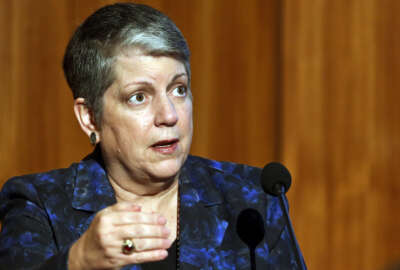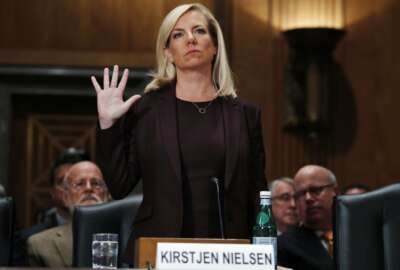
Nominee for DHS secretary promises employee protection, border and information security
If confirmed Kirstjen Nielsen would inherit a department that just reversed a six-year trend of declining employee engagement scores.
President Donald Trump’s pick to lead the Homeland Security Department pledged to prioritize and take a “holistic” approach to hiring in critical areas such as the northern and southern borders and in cybersecurity offices.
“We need to look at it holistically, the system needs to keep up with the times,” said Kirstjen Nielsen, during her nomination hearing on Wednesday before the Senate Committee on Homeland Security and Government Affairs. “So whether that is the way in which we’re advertising, the way in which we’re allowing those to apply. As I understand it, unfortunately, some of the websites for example, where jobs are listed, the links are bad. So some of this is … low hanging fruit if you will. But from a holistic perspective we’ve got to have the internal controls in place to ensure not only the hiring side, but then all the way through the cycle of retention and professorial development.”
Nielsen also acknowledged that for DHS’ mission, especially when it comes to adequately staffing borders, operational needs can be supported through “a combination of both personnel and technology.”
“We also have to remember that technology can always serve as a force multiplier,” Nielsen said.
Nielsen currently serves as the president’s deputy chief of staff. She previously served as former DHS Secretary John Kelly’s chief of staff, before he moved over to the White House.
The committee is expected to vote on Nielsen’s nomination on Thursday.
Addressing today’s threat
If confirmed, Nielsen will take the reins of an enormous department boasting more than 220,000 employees and including components that deal with everything from immigration to transportation security.
Those component missions were also at the front of the senators’ minds during the hearing, with questions coming from both Democrats and Republicans on topics like border security and counterterrorism.
Sen. Margaret Hassan (D-N.H.) wanted to know what specific steps Nielsen would take to “address the threat from our terrorism diaspora.”
“Awareness, outreach, ensuring that our intel is requirements based, moving toward a different model, making sure that we use a joint task force-like mentality within the department to make sure we’re leveraging all the different parts,” Nielsen said. “And to be very clear and prioritize what the threat is, making sure that we’re addressing today’s threat, and not yesterday’s [or] the month before.”
Sen. John Hoeven (R-N.D.) asked Nielsen what she thought could be done to address radicalization of people either living in the U.S. or in another country.
Nielsen pointed to DHS’ tools and resources and working with state and local governments to share vulnerability assessments, active shooter drills, and exercises.
“The [joint terrorism task forces] that form with the FBI are crucial,” Nielsen said. “Ensuring that they have the tools that they need, working closely with the Department of Justice, offering everything we can from the federal government perspective.”
Nielsen said she would also lead DHS in working to address radicalization from two points: how someone becomes radicalized, and what the department can do to “off-ramp them,” and help them see there are “more productive ways to express their views that are protected in this country but to do so in a non-violent manner.”
Borders are not just physical barriers
Nielsen also fielded a number of questions about border security on both ends of the country.
“The president has been an advocate for a wall on the southern border,” said Sen. Jon Tester (D-Mont.). “What is your view on a wall and what’s your view on technology?”
Nielsen said she shared the belief with the president as well as her predecessors, that there was no need for a wall “from sea to shining sea.”
She pledged to work with state and local officials on the ground to understand the needs for a physical barrier.
“Technology plays a key part and we can’t forget it,” Nielsen said. “There’s a lot we can do with technology to help secure our border.”
Sen. Heidi Heitkamp (D-N.D.) stressed the importance of Nielsen’s commitment to northern border issues, because there is a gap in border security that’s tough to fill in terms of recruitment and retention.
Hoeven asked whether unmanned aircraft could be used for monitoring the northern border. Nielsen said she would support them if operations officials on the ground felt they could be useful.
“I think it provides us a very interesting capability as a force multiplier,” Nielsen said. “The ability to have not only situational awareness, but sensors that we now have available to us, enable us to detect a variety of threats that could be coming across our border.”
Nielsen also said metrics are vital to border security, and DHS needs metrics that demonstrate performance.
“I think we need to look at it as a very integrated system. It’s not just physical barriers. It’s personnel, It’s training. It’s technology. It’s working with state and locals. It’s understanding a variety of things that might be needed in special circumstances such as surge control or if there’s a natural disaster,” Nielsen said.
Nielsen added that the metrics need to be transparent, repeatable and able to be updated if they end up not being useful.
Cyber threats, whistleblower retaliation
Training and technology also factored in to DHS’ role in protecting the information of citizens.
Asked by Sen. Steve Daines (R-Mont.) about what she would do leading the government’s cyber efforts against global threats, Nielsen said today it’s about ensuring integrity of information.
Latest Management News
“The threat has changed,” Nielsen said. “If I were sitting here maybe even 10 years ago, I’d talk a lot about confidentiality. Data breaches continue to this day as you know, but what is perhaps more concerning is the ability of those who would do us harm through the internet to change the integrity of that information, or through ransomware and other attacks to make it not available.”
Nielsen said it’s important to have resilience built in, along with redundancy of key assets.
“When I look at the way in which we have worked as the department over the last 13 years, I think it has served us well to develop and create partnerships within the private sector, state and local governments,” Nielsen said. “But what we need perhaps as a next step, next evolution, is to look across sectors, across regions, and to really look at those critical assets and critical pieces of information that we need to ensure that we’re protected. In my view there is an enhanced federal role in that protection.”
Nielsen said there is also a need to protect employees when it comes to whistleblower retaliation.
Sen. Claire McCaskill (D-Mo.), who said she is a “big believer that there must be whistleblower protection” asked for Nielsen’s opinion on those employees who blow the whistle.
Nielsen said she would do everything in her power to ensure there is no whistleblower retaliation and said those employees are an important pat of the way the government functions.
“I believe within each department we need to ensure not only that there is an environment of trust and respect, but there is a safe place for voices to be heard,” Nielsen said. “It is vital that we understand any concerns of employees.”
Copyright © 2025 Federal News Network. All rights reserved. This website is not intended for users located within the European Economic Area.





